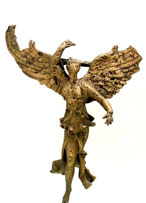| Author | |
|---|---|
| Epoch | XIV c. |
| Work | The Story of Genghis Khan, i.e. how He Appeared in the Eastern Country (Life of Kartli, text identified based on all key manuscripts by S. Kaukhchishvili, v. II, Tbilisi 1959) |
| Type | |
| Quote | “[…] I want to mention something else, something that happened by king Astyages’ intention. The prophesy, that he [Astyages – E. K.) would send her daughter Mandane to the Persians and she [Mandane, - E. K.) would bear a son, Cyrus, who would succeed Astyages as a king, did not materialize. So the prophesy of Apollo’s queen, whose prophesy was not understood by Croesus and was defeated by Cyrus in action and taken prisoner by Cyrus, was not fake (in vain). Although, king Priam’s prophesy on Alexander Paris, pronounced 32 years earlier who, the abductor of Helen, wife of Agamemnon, the brother of Menelaus, defeated Trojans after twenty-eight-year long war and fully exterminated their race, did materialize" (pg. 205) |
| Term |
|

| Comment | T. Khaukhchishvili: “It is hard to establish the source, but the source may be the same “Judean History”, or more probably – “Antiquities of the Jews” – the second work of Josephus Flavius” (T. Khaukhchishvili, Antique World in Georgian Historiography, Chronicler, Collection of Works Dedicated to 100th Anniversary of Iv. Javakhishvili’s Birth, Tbilisi, 1976, pg. 293). V. Asatiani: “Herodotus, the “father of history” tells us a lot about Astyages (V century B. C.) in his History (I, 46; 73-75, 91, 107-112, 114-130, 162; III, 62, VII, 8 etc) (Ancient and Byzantine Traditions in Old Georgian Writing, Tbilisi, 1996, pg. 130). According to Al. Gamkhrelidze’s conclusion, “Karesus” of the “life of Kartli” is a well known king of Lydia, Croesus and the source of this episode is George Hamartolos’ “Chronicle”. Whatever concerns the Queen of Apollo, this must mean Apollo of Delphos or Delphi, but if the word “queen” is to necessarily remain, then we must understand the Queen of Apollo as Pythias (Al. Gamkhrelidze, Georgian historical sources, The Chronicler of Carisos, / Crisos/ Croesus, (III, 1971, pg. 191-194). T. Khaukhchishvili: “Naturally, Al. Gamkhrelidze’s observation makes the subject of the text clear (the prophesy of Delphi’s oracles was not understood by Croesus, he was defeated in the war by Cyrus and Cyrus captured him), but the sentence is still not fully streamlined” (T. Khaukhchishvili, Antique World in Georgian Historiography, Chronicler, Collection of Works Dedicated to 100th Anniversary of Iv. Javakhishvili’s Birth, Tbilisi, 1976, pg. 293). T. Khaukhchishvili: “Here, Trojan War’s cause and its end are clearly provided and the war itself, according to the author, had lasted for 28 years… It turns out this version of time-span of Trojan War was known in Georgia, but according to the opinion prevalent in Georgian science, Georgians knew the works on Trojan War cycles not through Homer, but via some other version. (It will be more correct to say, that they were familiar with the works on Trojan War cycles not only through Homer’s version)” (T. Khaukhchishvili, Antique World in Georgian Historiography, Chronicler, Collection of Works Dedicated to 100th Anniversary of Iv. Javakhishvili’s Birth, Tbilisi, 1976, pg. 293). |
|---|

